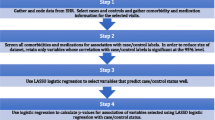Abstract
The reliability was measured with which out-patient medications were identified at the time of a patient's admission to a Dutch hospital. The hospital-pharmacy records and the community-pharmacy records of 205 patients have been reviewed with the help of an expert panel. We established that 15 inadvertent drug discontinuations of a serious nature occurred among 12 patients. While the results are not necessarily representative of the overall Dutch situation, they indicate errors that can be reduced. Improvement is suggested by transmission of computerized data from the community pharmacy to the hospital whenever a patient is admitted and agrees with this transmission.
Similar content being viewed by others
References
De Graeff PA. De gevaren van het plotseling staken van geneesmiddelen [Dangers of sudden cessation of drug therapy]. Ned Tijdschr Geneeskd 1985;129:1034–9.
Price D, Cooke J, Singleton S, Feely M. Doctors' unawareness of the drugs their patients are taking: a major cause of overprescribing? Br Med J 1986;292:99–100.
Schwarz A, Faber U, Borner K, Keller F, Offermann G, Molzahn M. Reliability of drug history in analgesic users. Lancet 1984;2:1163–4.
Bellamy N, Grace E, Hanna B, Grant E, Tugwell P, Buchanan WW. Clinical evaluation of two strategies for improving patient recall of prior drug therapy. Br J Clin Pharmacol 1984;17:769–72.
Gilchrist WJ, Lee YC, Tam HC, Macdonald JB, Williams BO. Prospective study of drug reporting of general practitioners for an elderly population referred to a geriatric service. Br Med J 1987;294:289–90.
Leister KA, Edwards WA, Christensen DB, Clark H. A comparison of patient drug regimens as viewed by the physician, pharmacist and patient. Med Care 1981;19:658–64.
Claoue C, Elkington AR. Informing the hospital of patients' drug regimens. Br Med J 1986;292:101.
Monson RA, Bond CA. The accuracy of the medical record as an index of out-patient drug therapy. JAMA 1978;240:2182–4.
Johnson RE, Azevedo DJ, Campbell WH, Christensen DB. Examining physicians' drug ordering behavior. Med Care 1978;16:408–16.
Hulka BS, Kupper LL, Cassel JC, Efird RL, Burdette JA. Medication use and misuse. Physician-patient discrepancies. J Chron Dis 1975;28:7–21.
Bond CA, Monson R. Sustained improvement in drug documentation, compliance and disease control. Arch Intern Med 1984;144:1159–62.
Duthie DJR, Montgomery JN, Spence AA, Nimmo WS. Concurrent drug therapy in patients undergoing surgery. Anaesthesia 1987;42:305–6.
De Smet PAGM, Leufkens HGM. ATC-klassificaties en DDD-waarden [ATC classifications and DDD values]. In: De Smet PAGM, Van Loenen AJ, Van der Does E, eds. Informatorium Medicamentorum 1987; deel III. Alphen a/d Rijn: Samsom Stafleu, 1987:300–32.
Kerremans ALM. Klinisch belangrijke geneesmiddelinteracties [Clinically important drug interactions]. Ned Tijdschr Geneeskd 1989;133:148–51.
Dolmans JMEV, Mertens PB. Geneesmiddelenpaspoort-gebruik en toelichting [Drug pasport — use and explanation]. Pharm Weekbl 1979;114:1157–64.
Jenkinson S. Medical credit cards. Br Med J 1989;299:472.
Stoffels MJC. De ‘smart card’ in de gezondheidszorg [The ‘smart card’ in health care]. Med Contact 1988;43:405–7.
Van Gruting CWD, De Gier JJ. Medicatiebegeleiding [Medication support]. Pharm Weekbl 1987;122:1057–65.
Petri H, De Vet HCW, Naus J, Urquhart J. Prescription sequence analysis: a new and fast method for assessing certain adverse reactions of prescription drugs in large populations. Stat Med 1988;7:1171–5.
Author information
Authors and Affiliations
Rights and permissions
About this article
Cite this article
Van Hessen, P.A.W., Petri, H. & Urquhart, J. Do prescribed drugs always follow the patients to hospital?. Pharmaceutisch Weekblad Scientific Edition 12, 66–70 (1990). https://doi.org/10.1007/BF01970148
Accepted:
Issue Date:
DOI: https://doi.org/10.1007/BF01970148




